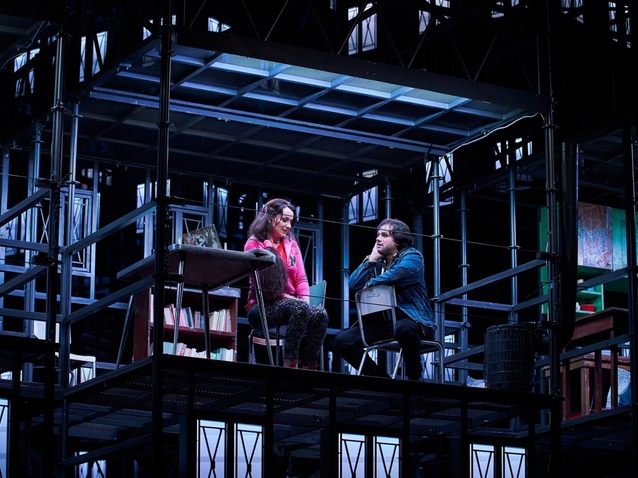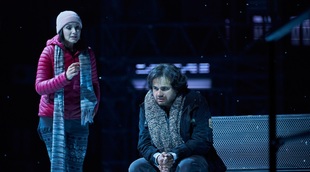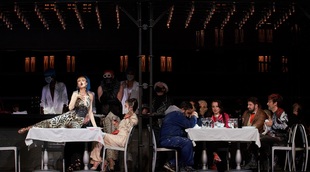 © David Ruano
© David Ruano
La Bohème, the title that never fails, the joy of the box office, has come back to Liceu. For over a hundred years La Bohème has continued to work perfectly around the world. Firstly, this is due to the underlying moral and ethical codes continuing to be largely valid, with little variations. And because the late Romantic and bourgeois concept of love (and sex) and of couple relationships on which it is based continue to be largely shared in the Western population.
In La Bohème we vicariously (intensely but without direct personal risk) experiment the scary fragility of happiness. That old lovely story of penniless characters who love each other tenderly as they die of cold and misery always reaches the sensitive and well fed souls of the stalls audiences with great strength (and many tears).
The other great reason, the main one, that makes La Bohème work so well is its music, especially the (almost cinematographic) use of music as a mechanism of happiness remembrance during unhappy times. The two final acts are mainly constructed, from a musical perspective, around a re-elaboration of motifs which had initially illustrated happiness. Watching Mimì die whilst the orchestra play the theme from the first encounter between the two lovers in the first act has pleasantly devastating effects on the audiences’ emotivity.
The Bohème seen at Liceu is the result of a commission from the Teatro Regio di Torino in 2016 to stage director Àlex Ollé. He worked on this production with his excellent usual collaborators, scenographer Alfons Flores and lighting designer Urs Schönebaum.
Ollé moves the action from the bohemian Paris of the mid-19th century to the marginal and multicultural banlieue in present day Paris. The impactful scenography, with metallic structures reaching 18 metres in height, successfully evokes the sordid and impersonal big residential buildings crowded with people. Visually, the production is more powerful and impressive than beautiful, but works perfectly on stage.
From a dramatic perspective, the work remains intact, Ollé hasn’t interfered with the dramatic core and the character relationships are the same as when La Bohème was performed with fireplaces, scarfs and gas lamps. This is the best option to go with because when a work functions by itself - and La Bohème does – the best that one can do is to leave it alone.
Musically, the performance on the opening night only reached a discreet level. Everyone delivered, more or less, but this isn't good enough in a work which is a feature of the repertoire and has been tackled by all the great interpreters of the last century. Brazilian tenor Atalla Ayan did not shine in Rodolfo’s role. The voice was beautiful, and he sung with good taste and phrasing, but the sound was not well projected and did not cut through the orchestral wall clearly. Romanian soprano Anita Hartig did not overwhelm as Mimìeither, one of the most rewarding roles of the repertoire. She found dramatic accents and beautiful moments in the third act and did a rather worthy death but she didn't take advantage of her great moments in the first act.
Roberto de Candia was good as Marcello but didn't excel. Valentina Naforniţa was good vocally as Musetta and scenically spectacular in the disinhibited character – perhaps that's why the public applauded her so much. Toni Marsol did very well as Schaunard and Goderdzi Janelidze was disappointing as Colline, since she didn’t make the most of the opportunity to standout in the famous “Vecchia zimarra”.
The choir was very satisfactory, and the orchestra was sufficient and well conducted by maestro Giampaolo Bisanti, who obtained acceptable global results with voices that were below expectations.
Xavier Pujol
(Gran Teatre del Liceu. Barcelona, 14th June 2021)
La Bohème by Giacomo Puccini. Atalla Ayan, tenor. Anita Hartig, soprano. Roberto de Candia, baritone. Valentina Naforniţa, soprano. Toni Marsol, baritone. Goderdzi Janelidze, bass. Roberto Accurso, baritone. Orchestra and Choir of Gran Teatre del Liceu. Giampaolo Bisanti, conductor. Àlex Ollé, stage director. Susana Gómez, associate director. Alfons Flores, scenography. Lluc Castells, costumes. Urs Schönebaum, lighting. Production by Teatro Regio di Torino.
the 16 of June, 2021 | Print



Comments